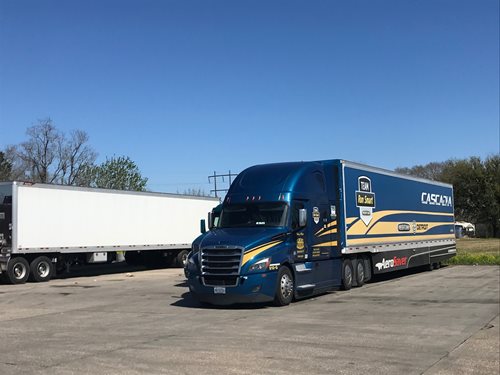 This week I found myself on the graveyard shift all week on a route from Laredo, TX to Swedesboro, NJ. The decision was made to do this run at night to time out my route in a way to miss the traffic in Houston, TX, Baton Rouge, LA, Atlanta, GA, Charlotte, NC, Richmond, VA, Wilmington, DE, and Washington DC. The route chosen to accomplish this 1,900 mile route was as follows I-35, I-10, I-12, I-10, I-65, I-85, I-285, I-85, I-95, I-295, US-50, US-301, US-1, I-95, and I-295.
This week I found myself on the graveyard shift all week on a route from Laredo, TX to Swedesboro, NJ. The decision was made to do this run at night to time out my route in a way to miss the traffic in Houston, TX, Baton Rouge, LA, Atlanta, GA, Charlotte, NC, Richmond, VA, Wilmington, DE, and Washington DC. The route chosen to accomplish this 1,900 mile route was as follows I-35, I-10, I-12, I-10, I-65, I-85, I-285, I-85, I-95, I-295, US-50, US-301, US-1, I-95, and I-295.
I fueled up in Sealy, TX, on my way to Swedesboro, NJ, and operated at the speed limit up to 75 MPH where it’s safe and legal to do so. I did not refuel my Cascadia AeroX till I got to Mebane, NC, on my return trip at 2,048 miles into my 3,800-mile round trip. I pumped 196.923 gallons of fuel into the Cascadia's twin 120-gallon tanks for a fuel mileage average of 10.4 MPG.
The loads were light on this trip, and the speeds were high, with my average load weight being 15,000 pounds. Through the proper timing of this trip, it was accomplished in six days.
However, that is not the point of this story, which is, what it is like to try and rest when most of the world is active. I found it frustrating when operating on the night shift and sleeping in the day as there are many noises to awaken you. While trying to go to sleep, I would be jolted awake by air horns, brakes setting, back-up alarms, pre-trip brake pump-down, and people talking. While many of these sounds are unavoidable and part of our business, we can each do our part by trying to keep these noises to a minimum.
It made me think of the marine industry and its no-wake zones. For those not familiar with marine rules, there are often signs stating no-wake zones or idle only. This is done for many reasons, not only for the safety of the tight confines of a marina. This also protects the docks along with the boars moored with them not to be damaged by the waves caused by the wake of passing vessels. Also, there is more noise emitted from a watercraft at a higher speed. This got me thinking about why we do not treat the areas where we rest and fuel much the same way as a marina. If we kept our speeds below five mph, it would lead to a safer environment, a safer, quieter, and orderly place for us to "moor our ships." Think about your actions, such as blowing your air horn in the displeasure of another's action and how many people are awakened and now joining you in your displeasure. When you are doing a proper pre-trip and pumping your brakes down between two of your neighbors with their curtains pulled, assume they are asleep and consider moving to a more active zone of any given facility.
With all that being said, I am on my last day of this trip, and through all of my planning, it has been the perfect week of travel. I had zero traffic delays and, for the most part, got in a "solid" day's sleep. It is time now for me to set "sail" on the last day of this week's voyage and I just wanted to give you something to think about, whether it is day or night, your fellow driver might be trying to get some much-needed rest so try to be courteous to your neighbor the next time you are passing through.
Follow Team Run Smart Pro Henry Albert on Instagram and Facebook.